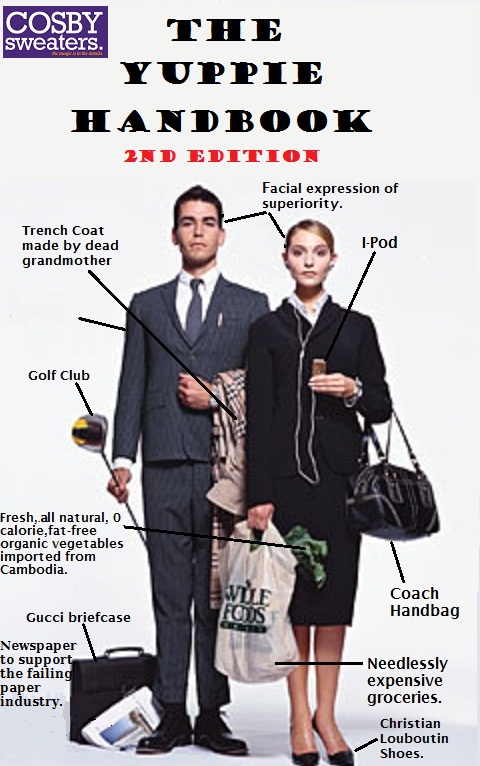At a party my mother threw this weekend, I chatted with an old friend’s father, kidding him about the way he used to make his daughters cook and do the laundry for the family. “We also used to tie their allowances to taxes,” he told me. “When our taxes went up, we gave them less, so they’d learn.”
“But you didn’t succeed in making them Republicans,” I said.
“Not yet,” he said. “When they get money, that’ll happen. Everyone becomes Republican at some point when the money comes in.”*
I thought about that exchange this morning when I read this piece, The Return Of The Yuppie (originally from 2006 but making the rounds again on Facebook), written ruefully by a man who once muttered Die, yuppie scum. Twenty years later:
I have become the enemy. Hi, my name is Jeff, and I am a yuppie.We’re all yuppies now.
Of course, that term, yuppie, has fallen so out of favor that we’re not even supposed to use it anymore. We’re expected to come up with a neologism — a clever 21st-century inversion of the word. But we’re not going to do that, because we don’t need to: The yuppie of 1986 and the yuppie of 2006 are so similar as to be indistinguishable. A used copy of The Yuppie Handbook recently fell into my hands. The book was published in 1984 as a jokey piece of social anthropology, and it made a slew of observations about this new American species. The yuppie’s bizarre lifestyle preferences were intended to elicit populist guffaws. Here are some of the things, according to The Yuppie Handbook,that the budding yupster could not live without: gourmet coffee, a Burberry trench coat, expensive running shoes, a Cuisinart, a renovated kitchen with a double sink, smoked mozzarella from Dean & DeLuca, a housekeeper, a mortgage, a Coach bag, a Gucci briefcase, and a Rolex.
- In exploring this group, referred to as “yuppies” as labeled in 1983 in the Yuppie Handbook (1984), the present generation can gain a better understanding of the decade of the ‘80s. Though multiple theories offer explanation for its existence, historians generally agree on the dominating factors composing yuppie mentality.
- The Yuppie Handbook: The State-of-the Art Manual for Young Urban Professionals. Marissa Piesman, Marilee Hartley. Pocket Books, 1984 - Humor - 125 pages.
The yuppie was still pretty dowdy in 1983, if the humorous American Yuppie Handbook and an American mug I have from the same time are anything to go by (they wanted pasta machines, Rolex watches, Sony Walkmans and a VCR), but within a few years the image had altered to that of Wall Street - 'Greed Is Good'.
C’est moi, he realized. Quelle horreur.
This spring, Teddy Wayne at the Times added to the portrait of the modern-day Yuppie:

We have plenty of [pop cultural] equivalents today, such as “This Is 40” (and nearly every other romantic comedy) and TV’s “Togetherness” and the recently departed “Parenthood” and “How I Met Your Mother” (and most other dramedies and sitcoms). Their organic-buying, gym-going, homeowning characters, however, aren’t tagged as yuppies as readily as those from the previous era were. It’s not because they aren’t from the narcissistic upper middle class; they certainly are. But they look different now.
The yuppie has shifted from standing on the prow of his yacht in an attitude of rapaciously aspirational entitlement to a defensive crouch of financial and existential insecurity. This instability has fragmented the yuppie’s previously coherent identity into a number of personae, each of which can trace its lineage to its ’80s paterfamilias.
Collectively, these microyuppies are just as strong in their ranks as their progenitors, if not more so. Three decades ago, the yuppie was viewed as a self-interested alien invader in an America that had experienced a solid 20 years of radical activism and meaningful progress in civil rights and women’s liberation. A generation and a half later, we have so deeply internalized the values of the yuppie that we have ceased to notice when one is in our midst — or when we have become one ourselves.
If Kafka wrote “the Metamorphosis” today, it would begin like so: “One morning, when Gregor Samsa woke from troubled dreams, he found himself transformed in his bed into a horrible vermin: a yuppie.”
The story would be about how his family would have to learn how to deal with him and their instinctive disgust. Only his sister would figure out a way to be kind — until finally even she, with tears in her eyes, would sidle into his dark bedroom one day, throw him a hoodie and some hair gel, and tell him it would be best for everyone if he left and got a job at Twitter.
Well, I’m not terribly bothered by idea that I might be a yuppie, considering I’m lucky to be making it in New York at all. I’m young(ish), I’m urban, I’m professional. I’m not huge on conspicuous consumption, but all I can really boast is that my gadgets are last generation: behold, my still-not-fixed iPhone 4; witness my creaky old Roku box! What can I say in my defense, before I am led to the guillotine? I voted for Obama twice, even when my husband was a corporate lawyer? At least I recycle?
*My friend’s father was not referencing Churchill, by the way. The quote often attributed to him — about being liberal at 25 unless you have no heart and conservative at 35 unless you have no brain — is actually unsourced but experts agree that it predates the 20th century. It might have been uttered originally by anyone from the King of Sweden to Victor Hugo.
What Does Yuppie Mean
Support The Billfold
The Billfold continues to exist thanks to support from our readers. Help us continue to do our work by making a monthly pledge on Patreon or a one-time-only contribution through PayPal.


Comments
